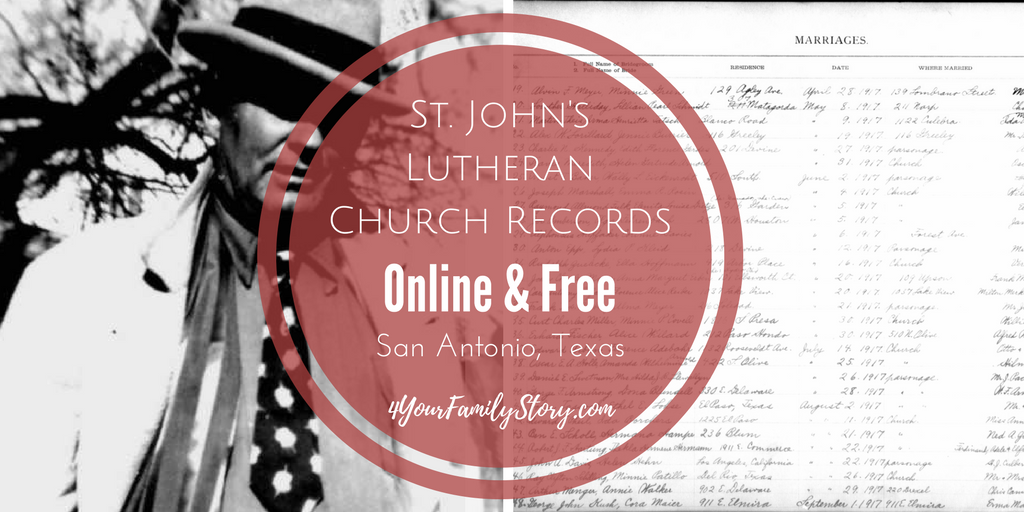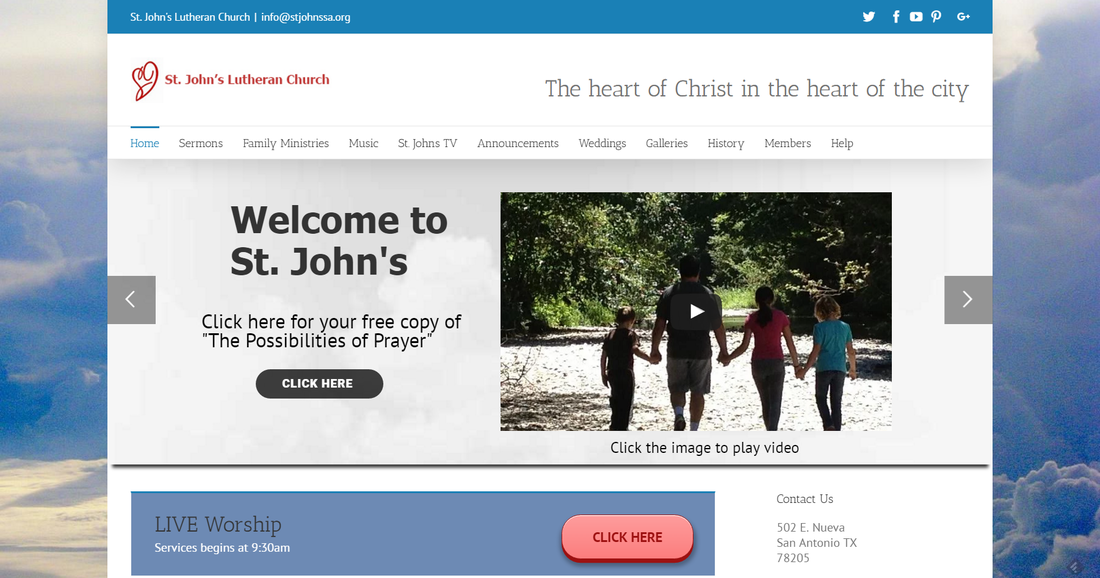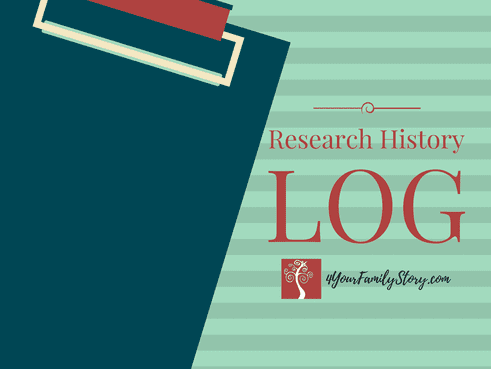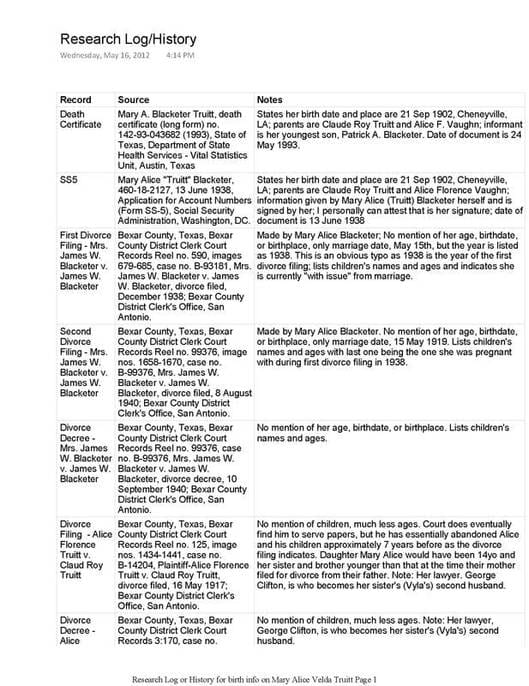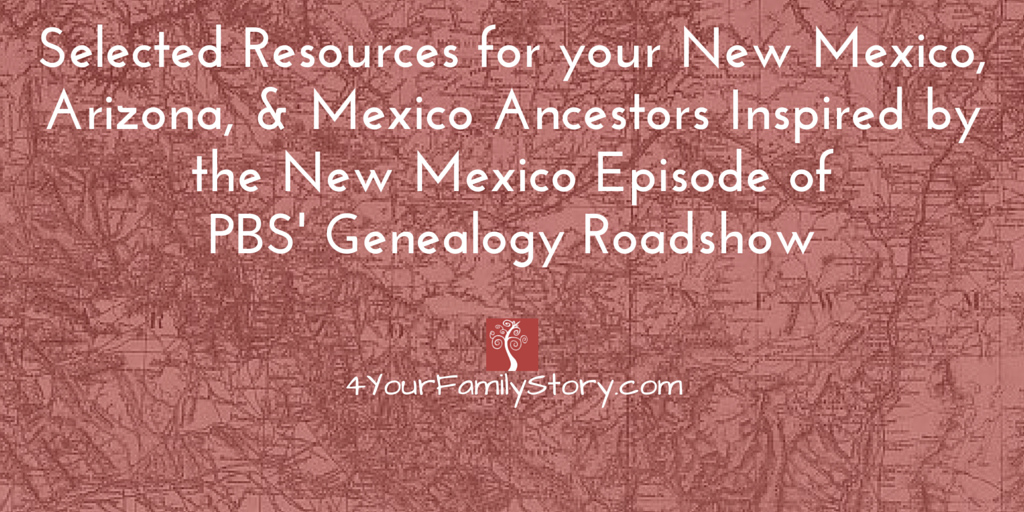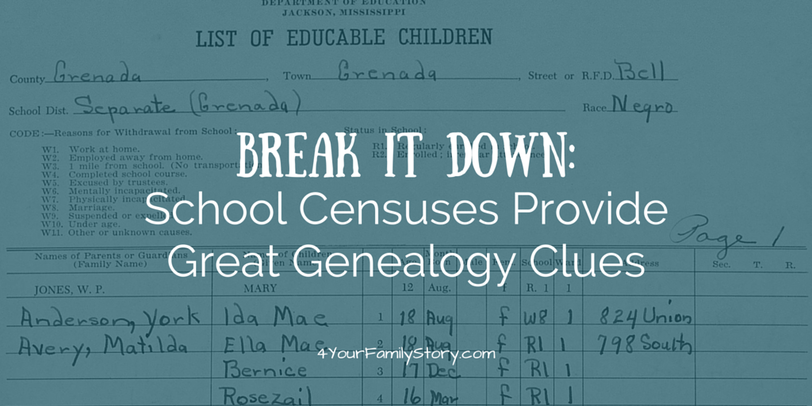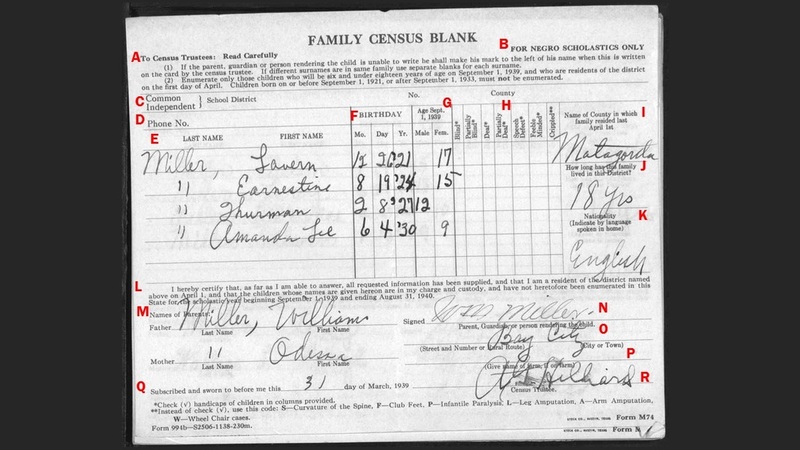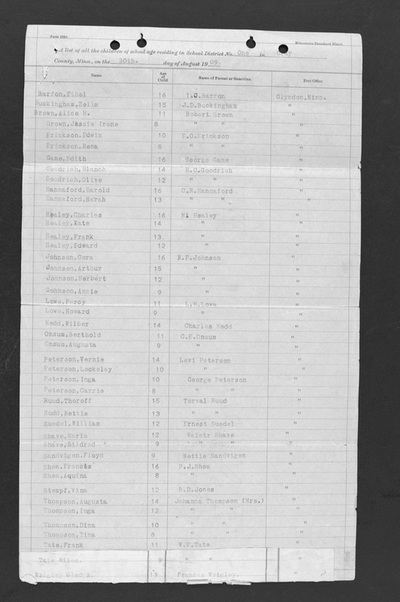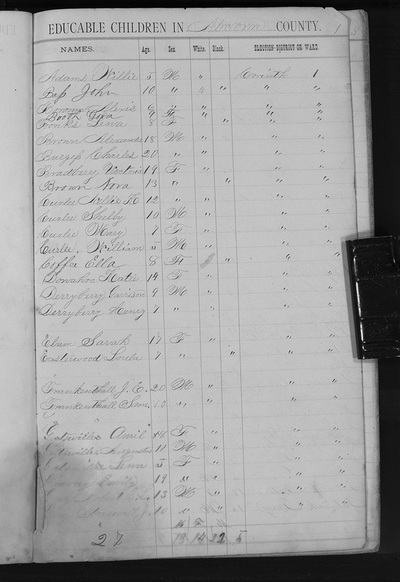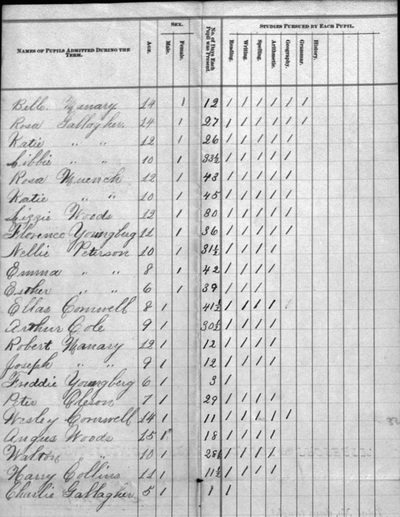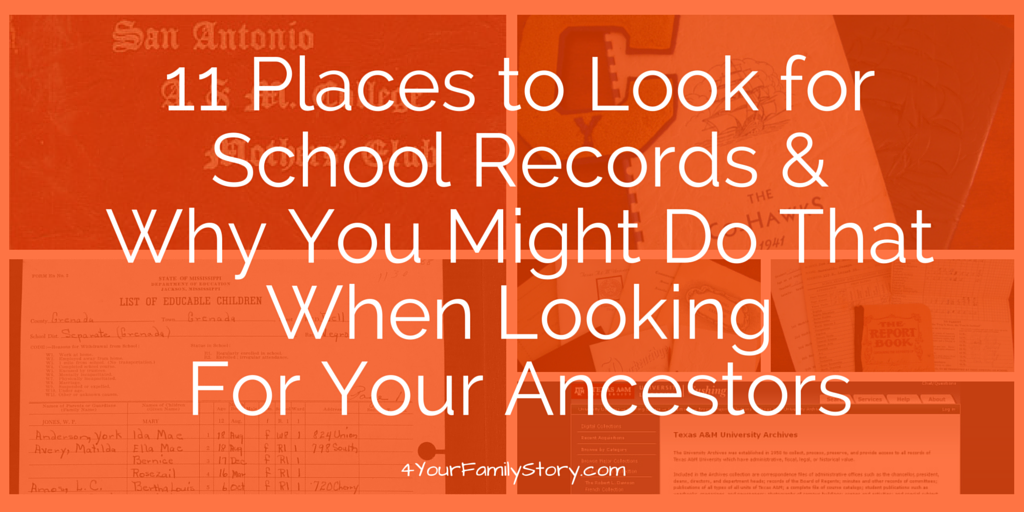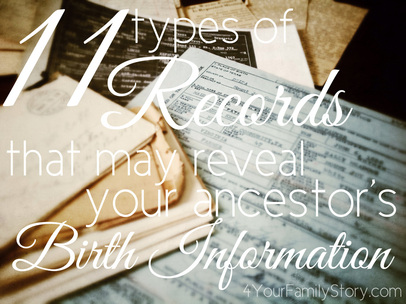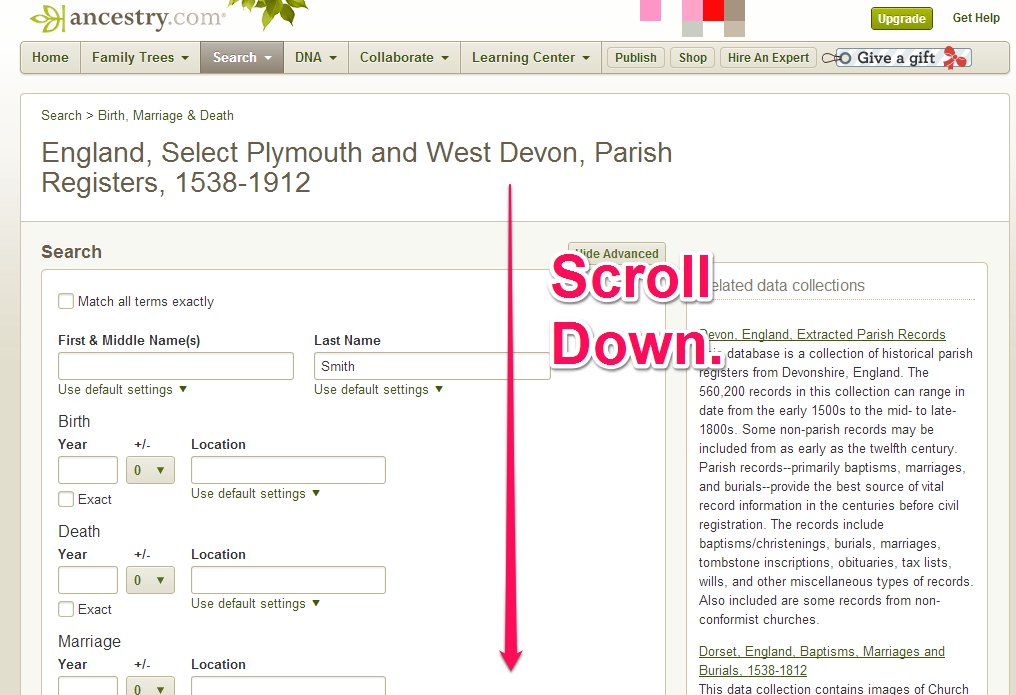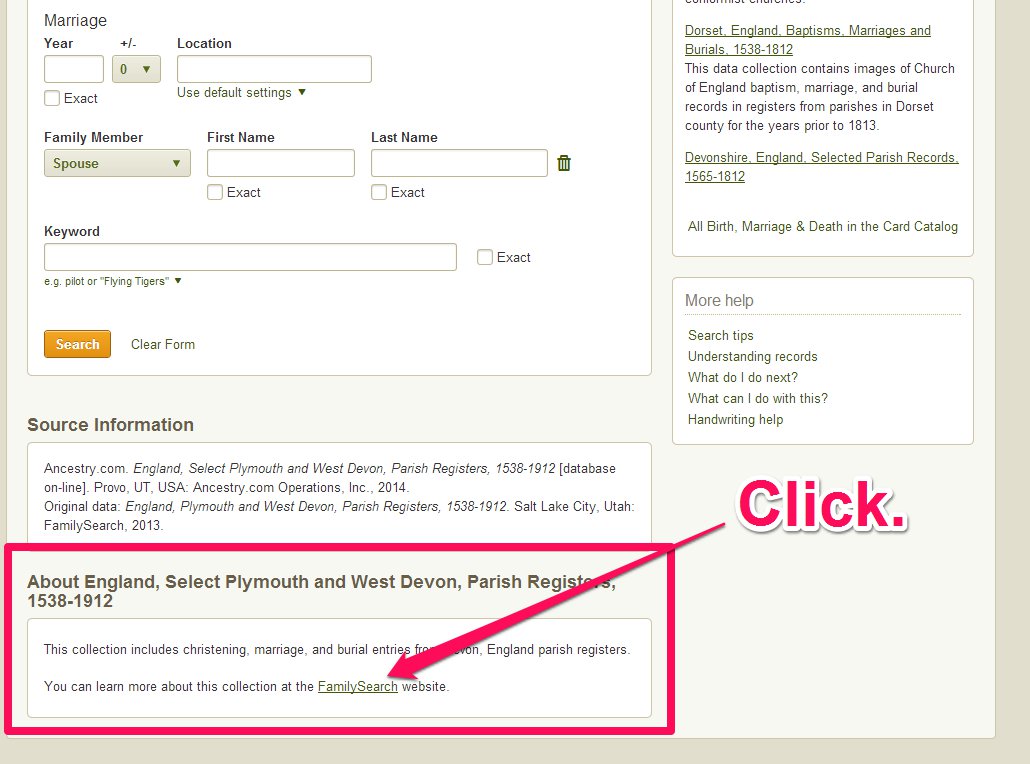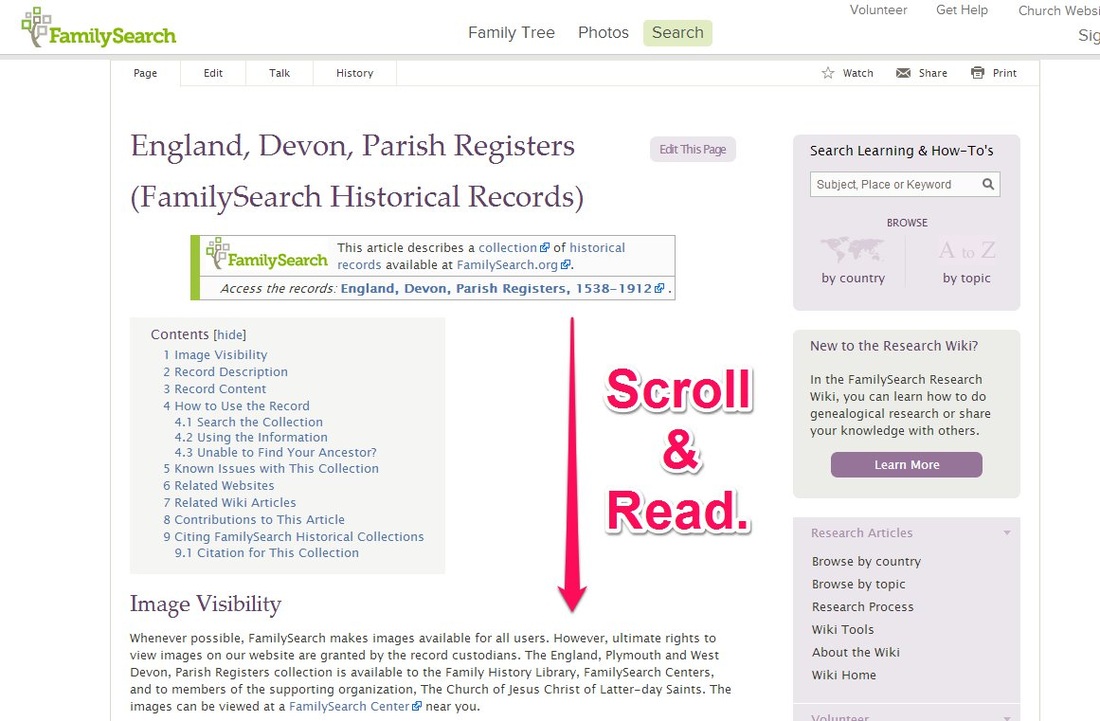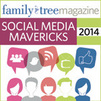|
My grandfather, Joseph Marschall/Marshall, a.k.a., Big Paw Paw, was a bigger-than-life character who had some really rocky relationships. Though not well-loved nor fondly-remembered by many (that I can find), his story and his family's story seem to demand to be found and told. I've been reviewing some older research I did previously on Big Paw Paw so I can unearth his parent's and grandparents' stories. Basically, I've been exploring as many of the details of his life I can possibly find in the two places he lived in Texas — Galveston and San Antonio. In doing so, I researched a little more about his marriage to his first wife, Emma Rosin, who also happened to be his sister-in-law — his oldest sister's husband's youngest sister. (Emma wasn't my grandmother. My grandmother was Big Paw-Paw's Wife No. 4. What can I say? My Big Paw Paw was a complicated man, but his complications have left me records. So there's that.) St. John's maintains their own records and archives on-site and it's partially online as well. Their church records date to their founding in 1857. Here is a list of what can be found on their website:
Pretty nice, huh? Online and free — magical words that make a genealogist's heart beat faster. Makes their pulse race. Gets their blood pumping ... well, you get the picture. Big Paw Paw's and Emma's marriage record was not online but a quick email sent to their office yielded, within a few days, a copy of the church marriage record entry that provided the names of the witnesses to their ceremony. Since its founding in 1857, St. John's Lutheran Church served the German-Texan community in the San Antonio area. And it's still an active church. If you have German-Texan ancestors who lived in the San Antonio area, checking these records just might help you with your family story just as it has helped me find a few more research avenues for discovering more about my Big Paw Paw, his parents, and his grandparents. And his wives. And his mistresses. I told you he was complicated. ~Caroline
2 Comments
This tip goes under "Things I Wish I'd Known To Do Then When I Started." Or something similar. But for some (or maybe many?) organizing is something we realize we need after we are already in the middle of our mess. We stop and realize, "Hm. I thought I'd remember this or that, but I've done so much, I don't even know what day it is." And that pretty much sums up a lot of things pertaining to life. And it certianly sums up all of our data, searching, and researching when it comes to family history. At the beginning you're in the "I got this" mode and pretty soon you're smack dab in the "Good Lord, who IS this person and didn't I look him up 5 months ago on such-n-such site" mode. You need to know who you've looked for, where you've looked for what it is you're looking for, what you've looked at, and you need to jot it down at the time you looked at everything. And that's where a Research History Log comes in handy. It's not a complete analysis of what you looked at because that should be in your research report or summary or notes (whatever you like to call it). It's a list or table that can quickly help you know what the particulars are for a specific piece of evidence that you've already looked at, and it can certainly make writing that research report (that comes from your research plan) much easier to write. Previously, I've provided some research plan templates for OneNote users, Evernote users, etc. So, I decided to provide a template for the Research History Log that I use for my personal research and for my client work. Personally, I prefer OneNote to Evernote but I've made templates for both. In and of itself, it's not earth-shattering, but like many things in life, just having the discipline to use it can work wonders on your family history pursuits. It's not magic, but it works. I did not make versions for Word or Excel because this is pretty simple to replicate. And here's an example (from OneNote) of what one looks like (the first page) already filled out. Basically, after finding a record that I was looking for (from my research plan), I added it to this log under "Record". Then I created the citation for the record (Your future self is really going to love you for this.) and logged it under "Source". Then I added notes to each one briefly explaining or summarizing what I found in regards to how it may or may not fit into the puzzle (question) I'm trying to solve (answer). Manually doing this really forces you to stop and really take a look at what you are, well, looking at. Also, if the record doesn't help, I log it too. That way I know I've found and looked at it. I also log a search for a record that I thought would be where I was looking and wasn't. That's important to remember too and the log helps you to remember. (Not finding it where you thought you'd find it also may be helpful for finding the solution to the problem.) Also, remember that just because I'm giving templates for specific technologies, the most important thing is that you use a research history log in whatever manner you want to. Handwrite it on notebook paper and put it in a binder or folder. The point is to get it done. So, below are the freebie templates. Enjoy! OneNote Research History Log Template Versions 2010-2013 (For those who use the current version of OneNote. Download the file and open in OneNote. Then you can save it as a template in OneNote. See my OneNote page and videos on how to do this.)
OneNote Research History Log Template for OneNote 2007 and earlier versions (Download the file and open in OneNote. Then you can save it as a template in OneNote. See my OneNote page and videos on how to do this.)
Evernote Research History Log Template (Links to a shared public Evernote folder with other free templates; just copy and paste from there into a note in your Evernote. For more detailed instructions, visit my Evernote page and watch my Evernote video.) Decorative Printable — PDF Version of the Research History Log Template (Download and save to your computer, print it out, and fill it in manually.)
~Caroline
Last week's episode of PBS' Genealogy Roadshow was jam-packed with all sorts of genealogical and historical topics of the American Southwest and shared heartwarming family stories. What sets Genealogy Roadshow aside from some of the other genealogy television shows is that they research the family histories of non-celebrities while sharing a wide variety of research resources and tips. While they give some research tips on their website, I thought I'd throw together some selected resources for those who have New Mexico, Arizona, and Mexico ancestry. It's not exhaustive but it's quite a bit to get you started with finding your own heartwarming (and sometimes surprising) family stories.
Databases & Research Guides Ancestry (Some $$, some free)
FamilySearch (Free)
Findmypast ($$) MyHeritage ($$) USGenWeb (Free) WorldGenWeb (Free) US GenWeb Archives (Free) Genealogy Trails (Free) Cemetery Databases Findagrave Billiongraves Interment.net Researching Your Ancestors Who Went Out West
Newspaper Links & from The Ancestor Hunt (Free) TheAncestorHunt.com has the biggest and most up-to-date listing of online newspapers. Plus, he has tons of tutorials and videos to show you how to find your ancestors in newspapers — all for free!
Cyndi's List (Free) Linkpendium (Free) Maps ►New Mexico Various present-day maps showing counties, rivers, etc. Historical maps ►Arizona Various present-day maps showing counties, rivers, etc. Historical maps ►Mexico Various present-day maps Historical maps Selected Archives/Libraries
Selected Genealogical, Historical, & Lineage Societies
Blogs
Selected Books These are just a very selected few. Links go to Amazon, but they are not affiliate links.
Selected Facebook Groups Meet and collaborate with others in Facebook Groups!
Links to Other Topics Covered on Genealogy Roadshow
So, do you have any resources you'd like to add? Share in comments below! And don't forget to watch the next episode of PBS' Genealogy Roadshow in Miami on Tuesday, May 24th at 8PM ET / 7PM CT on your local PBS channel.
~Caroline Other articles you might like: School Censuses Provide Great Clues To Reveal More About AncestorsHaving problems finding your ancestors in a particular time or place? Having problems learning who their parents were? How about confirming their date of birth? All of these clues/answers (and more) might be found in school census records. In many areas in quite a few states, school districts would take a census of their students to help them properly allocate funds for each school. They did them in various time periods and are incomplete, but if your ancestor was attending a school in a school district where it was taken *and* in a time period they took it, they can be a gold mine of information. At the very least, a school census record may place your ancestor in a time and location which can lead to more records and more answers. (And possibly more questions to answer because genealogy. ;) ) TIP: You will want to read each school district's instructions to the enumerator to make sure you fully understand the answers. Okay, so let's take a look at and break down the following example of a school census record for Matagorda County, Texas from 1939. (1) [Click on the image for a larger view] Breaking Down a School Census RecordA — To Census Trustees: Read Carefully — The census trustee's (enumerator's) instructions. [Hint: The census trustees were the enumerators and understanding what their instructions were will help you to understand all of the information in this record. So, you need to read this carefully, too.] B — Race — Schools were segregated based on race in this time period. C — School district information; in this example, it was left blank. D — Phone No. of school district. E — First and last name of students of the same family household who would be six and under eighteen years of age on April 1st. All were to be listed even if they had different surnames, as long as they were in the same family. F — Birthday of listed students. G — Age the listed students would be when they would be starting school 1 September 1939; also gender is indicated by the column the age was put into. H — Handicap designation: Census trustees were asked to indicate if each listed student had any of the following specific handicaps: blind, partially blind, deaf, partially deaf, speech defect, feeble minded, and/or crippled. For the ones who were characterized as crippled, the trustees were also asked to indicate whether the crippled student had a curvature of the spine, club feet, infantile paralysis, leg amputation, arm amputation, or if they were in a wheelchair. I — Name of county in which family resided last April 1st. J — How long has this family lived in this District? K — Nationality (Indicate by language spoken in home) L — Parent/Guardian Certification made by the parent that the information given was correct; that they were a resident of the District as of April 1st; that they had custody or charge of the listed children; and that they had not already been enumerated in this State for the scholastic year 1 September 1939 through 31 August 1940. M — Names of parents. N — Signature of Parent, Guardian, or person rendering child [Hint: I would be careful with this information, or at least, I would be careful of the parents names listed before this as that explicitly asks for parent's names while this requires the signature of a parent, guardian, or one in charge of the child. Are they the same? Are the answers the same?] O — Address (In this example, the trustee only listed the city.) P — Give name of farm, if on farm (Hint: While left blank on this example, one cannot infer that this meant the family/household was not living on a farm because the trustee left other blanks empty on this form.) Q — Date subscribed and sworn. R — Signature of Census Trustee (enumerator). So, is any of this type of information found on this record the type of information you are looking for when researching your family's history? Could it be useful to your research? You betcha! Not all school districts collected the same information unfortunately. Below are a few more examples of school census records in different states. (2), (3), (4) How to find these records? Try these techniques and places: 11 Places To Look for Your Ancestor's School Records. So, are you using school census records to find more information about your ancestors? Will you use them? ~Caroline References: (1) "Texas, Matagorda County, School Census Records, 1923-1946." Database with images. FamilySearch. http://FamilySearch.org : accessed 11 August 2015; citing State Board of Education. Matagorda County Judge, Bay City. (2) "Minnesota, Clay County, School Census Records, 1909-1962." Database with images. FamilySearch. http://FamilySearch.org : accessed 11 March 2015. Citing State School Superintendent. Auditor-Treasurer, Moorhead. (3) "Mississippi Enumeration of Educable Children, 1850-1892; 1908-1957." Database with images. FamilySearch. http://FamilySearch.org : accessed 11 August 2015. Citing Department of Archives and History. Government Records, Jackson. (4) "South Dakota, School Records, 1879-1970." Database with images, FamilySearch. (https://familysearch.org/ark:/61903/1:1:QK73-CQJ6 : accessed 11 August 2015), McCook County, 1939. State Historical Society, Pierre. As I've been getting my daughter situated to go back for her second semester at college, I've been thinking about school records. She will be switching majors and switching to the main campus of her university after this next semester, and her records are completely digitized and handled online. A stark contrast to our ancestors' school records, for sure. A smidgen are online for us to peruse once we know where to look, but many of them are not. So, as with all records, trying to find what entities created the records and thinking about where they might be stored — online and offline — is the first step in trying to find your ancestors in them. And just why would you want to find your ancestors' school records? Well they can, at the very least, put your ancestors in a time and a place — very helpful when you can't seem to find them in more-used records like the federal population census. And even when you can find them in population census records, where were they in between the censuses since they were only enumerated every 10 years? Another good reason to try and find your ancestors' school records is that they may reveal their parents' names or siblings. So while not an exhaustive list, the following 11 places may yield school records for your ancestors.
Additional reference links: Like I mentioned, this is not an exhaustive list, but enough to get you started. Have you found school records for your ancestors? What and where did you find them? Share in comments below. ~Caroline 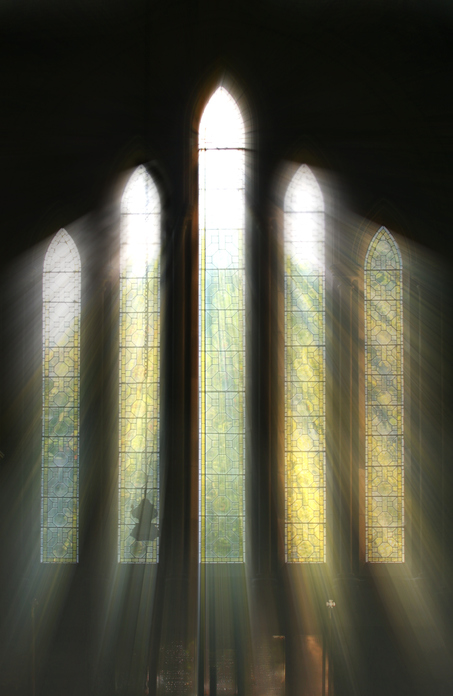 I'm trying to find evidence of a birth in 1860. I have his birth date and place from his death certificate and the census records loosely support that but I need something closer in time to when he was born. His obituary cannot be found which would not be closer, but still... And he died intestate and rather poor. His wife was appointed administratrix over...almost nothing. (I hate those slim envelopes in the mail from courthouses most of the time and this was one of those times.) Again, not closer in time to his birth. I first thought that since his mother had grown up Catholic and married in the Catholic church, it might not be so hard. After all, I already knew the Catholic records for Galveston, Texas were pretty easy to access. However, the archivist at the Catholic Archdiocese of Galveston-Houston disabused me of that silly notion rather quickly with a thin envelope in the mail of her own. She also seemed kind of sad in her letter to me about not finding it or his marriage record. I was almost consoled by that. <grin> So, it would seem this family line had a change in church denomination. Maybe. But I had no clue which denomination his father had been or what anyone else in the family had been. I knew my guy had been married in Galveston because I finally obtained his marriage record. Only cost me a day of driving in the pouring rain with high winds and a Fitbit. (Yes, I lost my Fitbit that day either in the McDonald's I stopped at to go to the bathroom or at the courthouse or in either of those establishment's parking lots. Stupid thing had been popping off lately and it did one last time...in the pouring rain.) When I got home and dried off I looked at the marriage record and transcribed it and the other lovely records I managed to wrangle from an obstinate clerk and then cooked dinner. Several days later I'm looking in the Galveston, Texas newspaper not for my guy but his brothers. Everyone is prominent in this family because of their grandfather and great uncle and two are lawyers including my guy. However, other than being a lawyer and advertising his business, his paper trail is slim. (Of course.) His lawyer brother is in the papers too because he flirted with politics. So, I get lots of hits for both of them in the newspaper searches. But his other brother? A minister. At least, that's what his death certificate lists as his occupation and the census records too. So, I was looking in the newspaper to see what I could see about the minister in this prominent family. And on the day this minister brother was ordained as a Presbyterian Minister up north, there was a 3 column write-up in the newspaper about it in Galveston. And I carefully began to read it. (Okay, I first skimmed it for personal family information which was at the end and quite abundant but I'd expect no less from this prominent family.) But then I went back and carefully read it from the beginning and then I recognized a name... ...a name of one of the ministers a part of my guy's brother's ordination. I pulled out my guy's marriage record and voila. The minister who had married my guy had also been a part of his brother's ordination and according to the article was the minister of the First Presbyterian Church in Galveston who had been next on my list to look up in the newspaper but wasn't my first choice because I figured he'd pop up a lot in the search. (Could you imagine? The christenings, marriages, & funerals he presided over as well as the titles of the sermons he gave? Because it appears after looking him up those made the papers too.) Of course, the city directories would have identified him as well, but I just thought, perhaps, since this was a prominent family in Galveston that my guy's minister brother would have showed up in the paper for...something. (And I had other clues I was looking for as well.) And a quick Google search told me the church was still open. So I called and found out that their historical records are kept at the Rosenberg Library. Of course, I already knew she meant the Galveston and Texas History Center which is the archives on the 3rd floor of the library which has an online searchable database of finding aids of their manuscript collections. And, presto — I have an inventory of all the church's records that they have. Looks like I'll be going back to the Island to see what I can see. (I'll have plenty of steps. Just no Fitbit to count them. If you lose your Fitbit but you still step, does it count?) But the clue was his brother was a minister. ~Caroline A single surname society is one where data and research on a particular surname beyond their own family members with that surname is gathered and published by researchers. These types of societies provide a single surname researcher a place to publish their work and to collaborate with other single surname researchers on that surname. This type of research, of course, can also be a great reference for any type of researcher to use. Below is a press release from a new society for single surnames called The Surname Society. You can join if you are interested in researching single surnames beyond your own family tree and then you can collaborate with others researching the same name. This new single surname society provides collaboration with other researchers around the world using online technology only. Take a look at what they have to offer below in their press release and on their website. Also, you can search their website for your particular surnames and see what research they have published already. They also have an introductory recorded Hangout On Air video on their "About Us" webpage. ~Caroline The founder members are delighted to announce the launch of The Surname Society - the online society for individuals, groups and associations with an interest in surname studies, regardless of their location in the world, the surname they are studying, or their level of research expertise.
Focussing on single surname studies, the society meets the needs of researchers in the world of family history and genealogy as it evolves in the 21st century. The Surname Society’s vision is to connect like-minded people by providing facilities which enable members to share knowledge, data and good practice with others. The society allows members to register both worldwide and limited studies and is entirely online. Collaboration is facilitated and encouraged as it is the core ethos of The Surname Society. Surname researchers collect data relating to all name bearers, either on a global or restricted basis. The society does not mandate study methods and members are encouraged to develop their own approach to the investigation of their surname to advance their knowledge and expertise in areas such as etymology, DNA, name collection and family reconstruction. The Surname Society will help and advise inexperienced members on ways to conduct their study and how to avoid the pitfalls which can occur! A truly global organisation from the outset, the committee members are located around the world from Australia to England, Spain and Canada and in the first week since its announcement to those who completed the online questionnaire, the society has almost one hundred new and enthusiastic members. The cost of membership to The Surname Society is just £5 per annum with no hidden extras. You can register as many names as you want on either a restricted or worldwide basis, collaborate with others, share in the educational opportunities offered and a plethora of resources in the Members’ area of the website including a fascinating quarterly e-newsletter and the School of Surnames, with many other developments in the pipeline in due course. So, what are you waiting for? Take a look at the website and if you are interested, join! For more information visit http://surname-society.org, email [email protected] and/or follow us on Twitter: @surnamesoc Will I find my Annie O'Brien and my O'Brien and Lennon families this weekend?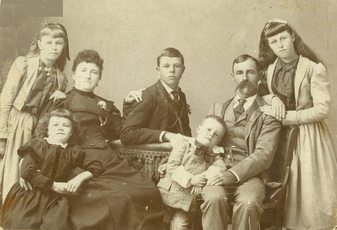 Annie (O'Brien) Vaughan is seated and 3rd from the left. Annie (O'Brien) Vaughan is seated and 3rd from the left. Every Friday, Findmypast releases thousands of new records online. This week's Findmypast Friday release includes wills and probate indexes as well as Thom's Directory, an Irish street directory and almanac, spanning the years 1844-1900. If you have Irish ancestry and have begun researching it (like I have), you know just how difficult it can be with a lack of records. And street directories can help to place your ancestor in a time and place between censuses. And the UK wills and probate records and abstracts can also be very helpful too. Abstracts can reveal spouses, children, etc., and also give you names of witnesses who may or may not have been related. Take a look at what they added:
So, if your roots take you back to Ireland or the UK, you'll want to check out all these new records as well as all of the Findmypast online records since it's a FREE weekend starting today. Plus, if you have roots across the pond, but don't know how to get started, then you're in luck. They have a free live broadcast tomorrow to help you out. And since Thom's Directory is for Dublin and my Annie O'Brien was born there and I've been needing to isolate all the O'Brien's and the Lennon's for this time period *and* since Findmypast is FREE this weekend, I think I'll forego sleep and delve into Findmypast into the wee hours of the weekend. (Time to dig out that old street map of Dublin I found online. Oh, Annie, Henry, James, and Jane...I'm coming for you.) Do you have O'Briens and Lennons in your family tree? Are we related? To read more about my research exploits with Annie et al, visit my personal (and very neglected) Family Stories blog. ~Caroline Take a look at these 11 kinds of records to help you find your ancestor's birth information.
Stuck trying to find birth information about your ancestors? Sometimes birth records can be harder to find than other types of records. Many times, we are looking for our ancestor's birth before registration of births began at the governmental level, but that doesn't mean you can't find clues to your ancestor's birth.
Here are 11 types of records that may include information or clues to find other records about your ancestor's birth:
Sure, some records will be better than others. Meaning that birth information listed on a cemetery record or a death record might not be as credible as baptismal records because generally you'd rather have information from a record created as close as possible to when the birth event occurred. The chances of details of the event being closer to the truth are higher on a record created near the time the event actually occurred. Usually. However, sometimes those older records are not available. So, a good practice is to make a reasonably exhaustive search of all the available records. What types of records have you been able to use for birth information or clues for birth information about your ancestor? ~Caroline
Note: If you are interested in republishing all or part of this blog post in a genealogical society's or genealogy organization's newsletter or journal, please contact me to make arrangements.
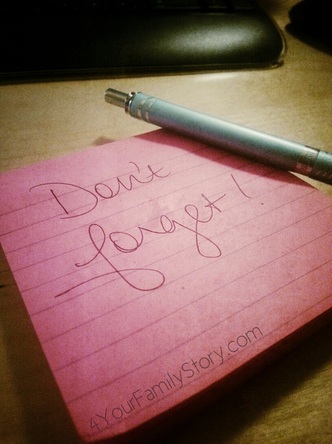 With the recent announcement by Ancestry.com of including indexed records from FamilySearch.org in Ancestry.com's online database collections comes convenience for Ancestry.com family tree users. Additionally, FamilySearch.org gets added exposure out to Ancestry.com users out of the deal. And you might not think that's a big deal, but I can't tell you how many times I come across Ancestry.com users online and in-person who have never heard of FamilySearch.org. But there's one thing the user -- the researcher -- needs to remember to do now. And it's critical for research progress or even success. And I've mentioned something related to it before. Remember when I wrote you could profoundly affect your research if you just did these 3 things? Well, when it comes to these repeated [and, really, that's what they are] collections from FamilySearch.org on Ancestry.com, the collection description is not listed on Ancestry.com. Nope. Instead there's this itty bitty link all the way at the bottom. And it's really the most important thing you can do on this page besides the ability to search the collection. And if you're not careful, you'll miss it. It should really be a button. A big red button. Because this fabulous link takes you to the description of the collection sitting over on FamilySearch.org's Wiki. And that's where you can find out more about what the collection contains before looking in it. So you know just what you're looking at. So you can make some headway on your research. Make some profound headway in finding your family stories. Happy Profound Researching! ~Caroline © Copyright 2014 4YourFamilyStory.com -- All Rights Reserved. Related Posts:
|
Categories
All
Archives
February 2017
|
||||||||||||||||||
|
© Copyright For Your Family Story 2016 - All Rights Reserved
|

